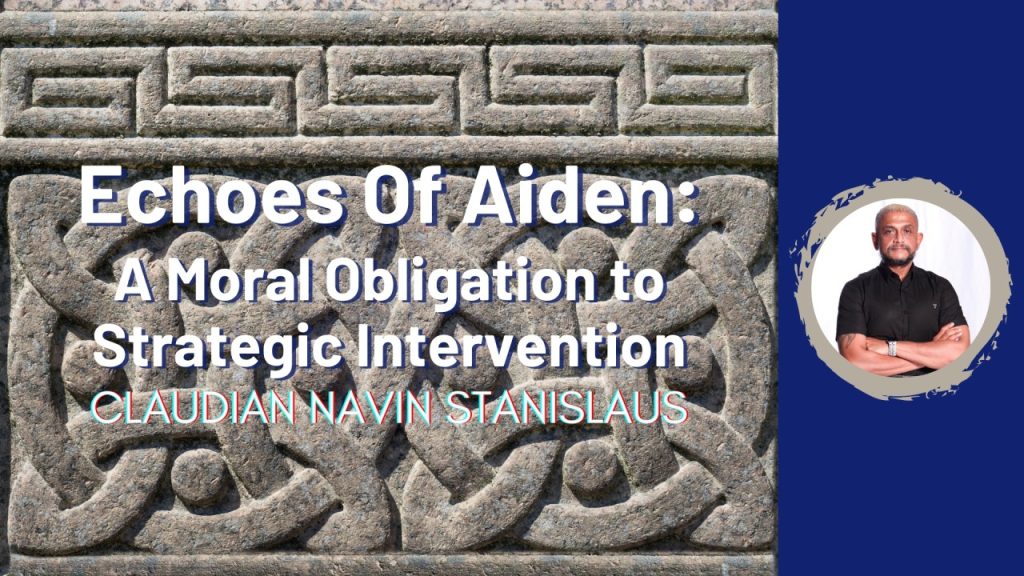BY CLAUDIAN NAVIN STANISLAUS – PRESIDENT, MALAYSIAN ADVERTISERS ASSOCIATION
In an era now lost to memory, reigned King Aiden, a beacon of resilience and wisdom. His kingdom: mirroring our own global village, grappled with an economic downturn, challenging the fortitude of its populace and the vision of its leadership. Though a fable, King Aiden’s tale is steeped in truths applicable to our own economic quandaries of today.
The heart of the kingdom’s vitality is not the gold in the treasury, but the well-being of the citizens
Understanding that the heart of his kingdom’s vitality hinged not on the gold in his treasury, but on the well-being of his citizens, King Aiden, when faced with calls from his lords to protect the kingdom’s coffers, chose instead to embark on bold initiatives to invigorate the economy of the kingdom by investing directly in the very foundation of the kingdom — its people.
Contrary to his nobles, who often appeased impoverished vassals by tossing coins to rapturous cheer, enjoying the spectacle of seeing them trip over each other scavenging for the pittance, and ensuring that tales of their wealth and benevolence were sung throughout the land, King Aiden chose a different path.
He redirected the kingdom’s wealth towards revitalising the economy, investing in the collective prosperity through initiatives that created income for small businesses, work for the artisans, and ensured more money flowed back into the hands of his citizens, rather than indulging in momentary displays of largesse.
Strategic intervention during periods of adversity, can stimulate demand, fuel innovation and entrepreneurship, and ignite the engines of a more sustainable economic revival – even amidst the gloom
King Aiden’s wisdom teaches us a crucial lesson about economic resilience. His tale illuminates the significant impacts of strategic government interventions during periods of adversity. reinject capital into the economy, we can stimulate demand. This, in turn, fuels innovation and entrepreneurship, drives productivity, and ignites the engines of a more sustainable economic revival and prosperity, even amidst the gloom.
There are certainly many parallels with historical precedents and real-world examples that echo King Aiden’s wisdom. The “New Deal” in the United States during the Great Depression stands as a monumental testament to this principle, where deliberate governmental investments in infrastructure and social programs ignited a wave of economic recovery.
Beyond the domains of K-Pop, dramas, and kimchi, South Korea presents a remarkable narrative of economic resurgence. Dubbed the “Miracle on the Han River”, South Korea’s ascent from a modest-income nation to a thriving high-income economy was significantly propelled by government-led initiatives focusing on pivotal industries, technology, education, and export promotion.
Creatively tailor policies can foster consumer spending, generate employment, and stimulate economic growth
Closer to home and more contemporary, Thailand’s innovative “Kon La Kreung” or “Half-Half” co-payment scheme exemplifies the potency of precise government intervention in stimulating economic activity during periods of adversity.
By underwriting half of consumer expenditures up to a specified ceiling, this program not only augmented the purchasing capacity of individuals but also funneled much-needed cash flow to local small and medium-sized enterprises.
This scheme, aimed at invigorating domestic consumption, mirrors the spirit of strategic economic stimulation seen in King Aiden’s wisdom, illustrating how governments of today should creatively tailor policies to foster consumer spending, generate employment, and stimulate economic growth which will concurrently uplift the populace.
Investments in the Small and Medium Enterprise (SME) sector are likely to generate a substantial multiplier effect, creating ripples of economic vitality
Exploring the economic theories underpinning King Aiden’s strategy reveals a strong alignment with Keynesian Economics. This school of thought centers on the concept of the multiplier effect and asserts that government expenditure catalyses demand, wherein an initial injection of spending triggers further spending, thereby amplifying overall economic activity.
Specifically, investments in the Small and Medium Enterprise (SME) sector are likely to generate a substantial multiplier effect. These enterprises typically reinvest a significant portion of their earnings into local goods, services, and wages, creating ripples of economic vitality.
This narrative transcends a singular theoretical framework, however, inviting a broader contemplation of diverse methodologies for economic rejuvenation. The essence rests on achieving a nuanced equilibrium, harmonising philosophies with real-world applications, tailored to the unique dynamics of the evolving economic landscape.
A nations fiscal strategy is a manifestation of both economic acumen and a profound moral commitment to the collective well-being of its people
The theoretical correlation to King Aiden’s approach sheds light on the economic principles it embodies. Yet, it beckons us towards a deeper, more existential examination. This narrative compels us to perceive a nations fiscal strategy as a manifestation of both economic acumen and a profound moral commitment to the collective well-being of its people.
Herein lies a philosophical contemplation on fiscal endeavors. They should not be viewed merely as tactical manoeuvres in the realm of economics but also as a testament to the ethical responsibility towards nurturing societal welfare. This dual pursuit of economic efficiency and moral integrity elevates the discourse, compelling leaders to consider not only the practical implications of their economic actions, but their ethical reverberations as well!
King Aiden’s strategy; mindful of inflation (or debasement, as it was termed in his era) and the risks of resource misallocation, incorporates comprehensive countermeasures to foster sustainable growth. This approach exemplifies judicious economic stewardship.
Through vigilant and continuous scrutiny, coupled with the flexible adjustment of regulations and policies, precise investments, and the formulation of clear exit strategies, the kingdom adeptly maintains stability.
Such a meticulous balancing act prevents potential pitfalls that could jeopardise its recovery endeavours.
This strategic foresight not only shields the kingdom’s economy against immediate threats but also fortifies its resilience against future uncertainties.
It underscores the importance of holistic planning in achieving enduring success, not just short-term recovery
Furthermore, the pillars of King Aiden’s policy are sustainability and innovation, with a visionary outlook interlaced throughout these initiatives. This progressive stance underscores the importance of holistic planning in achieving enduring success.
By prioritising these aspects, King Aiden not only addresses current economic challenges but also prepares the groundwork for a thriving, future-proof economy. This approach serves as a testament to the kingdom’s commitment to not just short-term recovery, but to a prosperous and sustainable legacy.
The tale of King Aiden, therefore, emerges not just as an allegory but as a guide for policymakers. As we confront our own economic tribulations, this story should act as both a reminder and a call to action!
Nations have an obligation, to craft strategies that genuinely uplift the lives of those they are meant to serve, going beyond mere optics
Nations have a profound opportunity, indeed an obligation, to craft economic strategies that fundamentally prioritise the well-being of their citizens above all. This moment calls for initiatives that go beyond mere optics, addressing the core necessities of the populace.
We too must champion a paradigm where policies are evaluated not on their immediate and superficial attractiveness, but on their profound ability to genuinely uplift the lives of those they are meant to serve. By advocating for measures that legitimately engage the economy’s mechanisms, we can initiate a cycle of prosperity that benefits all, rather than merely throwing some coins to the cheering crowds.
In essence, this approach represents not just an economic strategy but also a moral imperative, highlighting the responsibility of a nation to its people!
It’s a pivotal moment for decisive, action-oriented leadership that prioritises sustainable resilience over short-term appearances. Furthermore, in times of economic crisis such as these, the cost of inaction can far outweigh the risks of accruing debt!
Sourced from LinkedIn
MARKETING Magazine is not responsible for the content of external sites.











